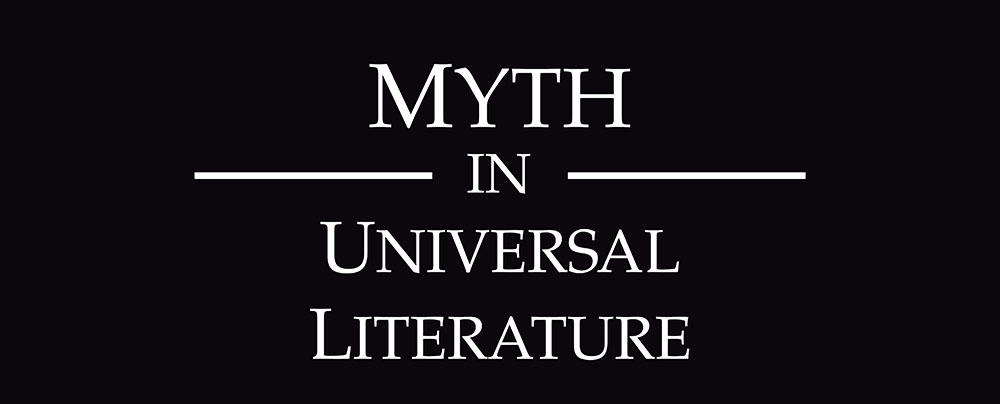Myth In Universal Literature

w
ONLINE INFORMATION
SECTION 1
EDMUND SPENSER (SONNET LXIV)
Coming to kiss her lips, (such grace I found)
Me seemed I smelled a garden of sweet flowers:
Rhat dainty odours from them threw around
For damsels fit to deck their lovers bowers.
Her lips did smell like unto Gilly flowers,
Her ruddy cheeks like unto Roses red:
Her snowy brows like budded Bellamoures,
Her lovely eyes like Pinks but newly spread.
Her goodly bosom like a Strawberry bed,
Her neck like to a bunch of Cullambynes:
Her breast like lilies, ere their leaves be shed,
Her nipples like young blossomed Jessemynes.
Such fragrant flowers doe give most odorous smell
But her sweet odour did them all excel.
WILLIAM SHAKESPEARE (SONNET CXXX)
My mistress' eyes are nothing like the sun;
Coral is far more red than her lips' red;
If snow be white, why then her breasts are dun;
If hairs be wires, black wires grow on her head.
I have seen roses damasked, red and white,
But no such roses see I in her cheeks;
And in some perfumes is there more delight
Than in the breath that from my mistress reeks.
I love to hear her speak, yet well I know
That music hath a far more pleasing sound;
I grant I never saw a goddess go;
My mistress, when she walks, treads on the ground:
And yet, by heaven, I think my love as rare
As any she belied with false compare.
GARCILASO DE LA VEGA (SONNET XXIII)
En tanto que de rosa y azucena
se muestra la color en vuestro gesto,
y que vuestro mirar ardiente, honesto,
enciende al corazón y lo refrena;
y en tanto que el cabello, que en la vena
del oro se escogió, con vuelo presto,
por el hermoso cuello blanco, enhiesto,
el viento mueve, esparce y desordena;
coged de vuestra alegre primavera
el dulce fruto, antes que el tiempo airado
cubra de nieve la hermosa cumbre.
Marchitará la rosa el viento helado,
todo lo mudará la edad ligera,
por no hacer mudanza en su costumbre.
SECTION 2
WILLIAM SHAKESPEARE (HAMLET ACT II, SCENE IV)
HAMLET.
Such an act
That blurs the grace and blush of modesty;
Calls virtue hypocrite; takes off the rose
From the fair forehead of an innocent love,
And sets a blister there; makes marriage-vows
As false as dicers' oaths: O, such a deed
As from the body of contraction plucks
The very soul, and sweet religion makes
A rhapsody of words: heaven's face doth glow;
Yea, this solidity and compound mass,
With tristful visage, as against the doom,
Is thought-sick at the act.
QUEEN.
Ah me, what act,
That roars so loud, and thunders in the index?
HAMLET.
Look here upon this picture, and on this, —
The counterfeit presentment of two brothers.
See what a grace was seated on this brow;
Hyperion's curls; the front of Jove himself;
An eye like Mars, to threaten and command;
A station like the herald Mercury
New lighted on a heaven-kissing hill:
A combination and a form, indeed,
Where every god did seem to set his seal,
To give the world assurance of a man;
This was your husband. — Look you now what follows:
Here is your husband, like a milldew'd ear
Blasting his wholesome brother. Have you eyes?
Could you on this fair mountain leave to feed,
And batten on this moor? Ha! have you eyes?
You cannot call it love; for at your age
The hey-day in the blood is tame, it's humble,
And waits upon the judgment: and what judgment
Would step from this to this? Sense, sure, you have,
Else could you not have motion: but sure that sense
Is apoplex'd; for madness would not err;
Nor sense to ecstacy was ne'er so thrall'd
But it reserv'd some quantity of choice
To serve in such a difference. What devil was't
That thus hath cozen'd you at hoodman-blind?
Eyes without feeling, feeling without sight,
Ears without hands or eyes, smelling sans all,
Or but a sickly part of one true sense
Could not so mope.
O shame! where is thy blush? Rebellious hell,
If thou canst mutine in a matron's bones,
To flaming youth let virtue be as wax,
And melt in her own fire: proclaim no shame
When the compulsive ardour gives the charge,
Since frost itself as actively doth burn,
And reason panders will.
QUEEN.
O Hamlet, speak no more:
Thou turn'st mine eyes into my very soul;
And there I see such black and grained spots
As will not leave their tinct.
HAMLET.
Nay, but to live
In the rank sweat of an enseamed bed,
Stew'd in corruption, honeying and making love
Over the nasty sty, —
QUEEN.
O, speak to me no more;
These words like daggers enter in mine ears;
No more, sweet Hamlet.
HAMLET.
A murderer and a villain;
A slave that is not twentieth part the tithe
Of your precedent lord; a vice of kings;
A cutpurse of the empire and the rule,
That from a shelf the precious diadem stole
And put it in his pocket!
QUEEN.
No more!

